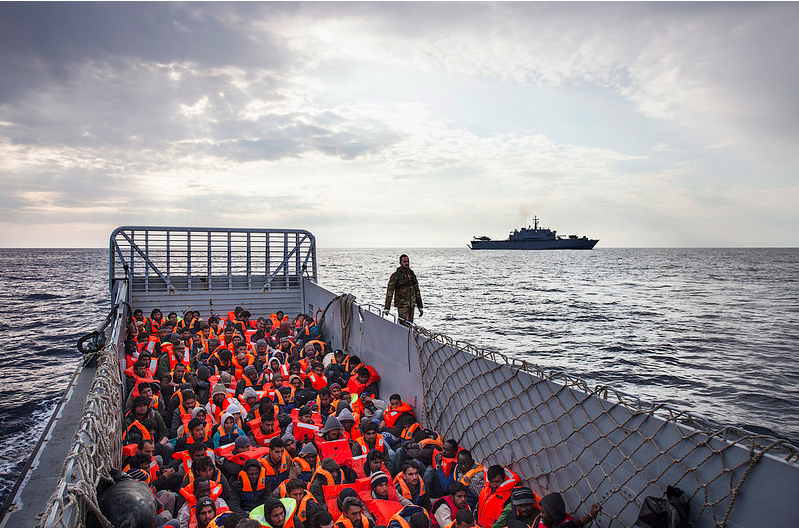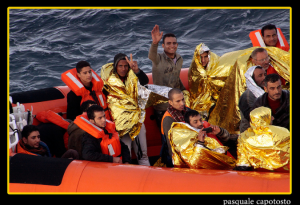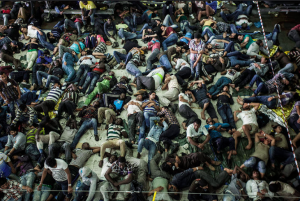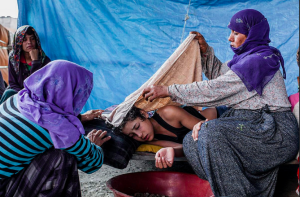Italy’s Veto Threat and the Refugee Crisis
 https://flic.kr/p/mo43WC Italian Navy transporting picked up refugees
https://flic.kr/p/mo43WC Italian Navy transporting picked up refugees
The Italian Prime Minister Matteo Renzi is currently threatening to veto the European Union budget if other EU member states do not accept refugees fleeing from various unstable North African nations. The high influx of migrants has placed a large financial burden on Italy, as its reception centres have become overcrowded and the bureaucratic process systems it has in place to process asylum seekers have become overextended. The majority of refugees are coming from Libya and other North African states, and are a result of the displacement that arose during the Arab Spring. Migrants are trying to enter central Europe via the Mediterranean Sea and through Italy. This year alone, around 155,000 refugees have arrived to Italy by sea and the Italian coastguard has rescued more than 6,000 people who have arrived on dangerous crafts. While the Italian government has generally had an open arms policy concerning asylum-seekers, Italian citizens are becoming increasingly more discontent with accepting the large volume of refugees.

As early as 2011, Italy has been tackling the issue of migrants in the form of asylum-seekers and refugees. Due to the high volume and intensity of movement, the topic of migration in Italy has been framed to the public as an invasion of refugees. Populist right-wing factions frame the incoming refugees as being a pervasive challenge to society and a burden on their host community. Recently, the small town of Gorino in the province of Ferrara was asked to host twelve women and eight children, but the refugees were unable to enter the town as locals barricaded the road into town and chanted “we don’t want them here.” The majority of refugees are people who are fleeing their war torn countries, and are simply trying to seek a better future.
While Italy has been accepting a large volume of refugees, many other European states are less than receptive to migrants. Neighbouring nations such as Austria, France, and Switzerland all have refused to accept asylum seekers and are continuing to crack down against migrants. In Germany, anti-migrant sentiment is high, with violent armed attacks being perpetrated against refugee shelters and politicians who support asylum-seekers. In France, bilateral conflict has arose with Great Britain as the two governments battle to decide who will take responsibility for the thousands of asylum-seekers who have gathered in the border town of Calais. In Britain alone, the pressure of the influx of refugees greatly contributed to the British decision to exit the EU. As a whole, European states seem as at a loss for how to deal with the refugee crisis. Although many politicians are suggesting that countries simply turn down refugees, for many people returning to their war-torn homelands is impossible. For Italy, the situation has turned dire and has forced Prime Minister Renzi to begin using financial tactics to make sure that Italy is heard. Renzi told RAI 1 television “We give 20 billion (euros) to Europe so that we can get back 12 — and if Hungary, the Czech Republic and Slovakia want to preach at us about immigrants, allow Italy to say that the system is no longer working.”

Although many of these nations play a large role in the European Union, they are reluctant to accept change when faced with an international displacement crisis. In response to the lack of solidarity, the Italian Prime Minister Renzi stated, “If you build walls against immigrants, you can forget about seeing Italian money. If the immigrants don’t go there, the [Italian] money won’t go there either”. While Italy is feeling the financial stress of the high influx of refugees on its reception centres and processing systems, the other European nations continue to close their borders. Rest assured, absent increased involvement and aid from the rest of Europe, Italy will begin to financially cripple the EU until other member states begin to step up to confront the crisis.

Most refugees that seek safety in Europe are desperate to get there. They pay exorbitant amounts of money to be stuffed onto a small ship and carted over the Mediterranean in hopes of securing a stable future. Most recently, people have been so desperate to be guaranteed safety in Italy that they dangled their babies over the side of a boat and threatened to throw their babies overboard if the Italian coast guard turned them away. After the coast guard assured them that they would not be sent back, they promptly pulled their babies back over to safety. This is but one example of the desperation that refugees have to seek a better future. Although the Italian people are reluctant to admit more refugees into their country, it is imperative that all those who are seeking relief can attain it. This may come in the form of other nations accepting more refugees, or in the Italian people adjusting to opening up their homes and their country. Regardless of how the solution to the refugee crisis comes about, it is time that we begin to view ourselves as citizens of a global community, and that international crises are not isolated from our daily lives.
